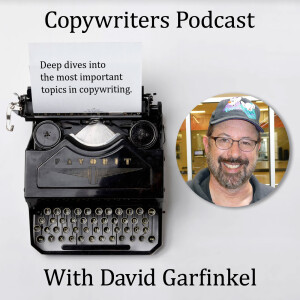
Contrarian Copywriting Strategies of a Veteran Business Owner
 2020-06-08
2020-06-08
Download
Right click and do "save link as"
On today’s show, we look at two very interesting questions:
First, how do you market your business when you have a highly specialized business almost nobody has even heard of before?
Second, how do you use copy in your business, when you’re not a copywriter yourself and you’ve never been able to find a copywriter that gets how to communicate what you do?
Our guest today, Rick Harmon, will help us get the answers to both questions. And this information will be very useful to any business owner who writes copy, and lots of useful tips for most copywriters, too.
Rick’s specialty, in a nutshell, is to make loans that help people straighten out messes with inherited property. Probate lawyers have a saying: “Where there’s a will, there’s a way. But when there’s no way in sight, Rick Harmon will find a way.”
Actually, they don’t have that saying at all. I made it up for this show. But they should, because that’s what Rick does. He straightens out probate messes that no one else can straighten out.
Now, sounds like a great service, but as long as it’s a business, you need to get clients. And that’s where Rick’s unusual story comes in.
We asked him these questions:
1. Can you give our listeners a little “slice-of-life” story that gives us a sense of how upside-down and inside-out things can go in your business?
2. Our mutual friend, the great sales trainer John Paul Mendocha, said something you have found incredibly useful in your marketing: “All sales is a process of disqualification.” What does that look like in real life?
3. Strategic Relationship Marketing
We start with a quote from a Hollywood composer, Bear McCreary, who wrote scores for many shows and films, including Battlestar Galactica, The Walking Dead, and Agents of S.H.I.E.L.D.:
“The kind of business skills that you need are really social skills. The smartest business move you can make is just being smart socially, politically. Understanding how to walk into a room and make everybody feel validated, make everybody feel like they’ve made a good decision in hiring you, or they should make a good decision hiring you.
“These are things that are political skills and social skills, but they’re sort of necessary in any business. If you walk around with an ego, if you walk around making people feel like you deserve the job, then ultimately that’s a bad business decision because you will just quit getting hired, whether or not your work is good.”
Rick, how does that square with your experience?
4. Finally, please talk about the lifetime value of a customer, and the value of the back-end, as it applies in your business.
Download.
More Episodes
Secret Lead Magnet Formula
 2024-10-28
2024-10-28
 2024-10-28
2024-10-28
Cult Building and Copywriting
 2024-10-14
2024-10-14
 2024-10-14
2024-10-14
How To Find The Elusive Hidden Benefit
 2024-10-07
2024-10-07
 2024-10-07
2024-10-07
The South Park Copywriting Secret
 2024-09-23
2024-09-23
 2024-09-23
2024-09-23
New Ways To Use FAQs
 2024-09-16
2024-09-16
 2024-09-16
2024-09-16
Secrets For Editing Your Copy
 2024-09-09
2024-09-09
 2024-09-09
2024-09-09
4 Seasons Of Copywriting
 2024-08-12
2024-08-12
 2024-08-12
2024-08-12
Confidence in Copywriting
 2024-08-05
2024-08-05
 2024-08-05
2024-08-05
Copywriting to Prospects with Money
 2024-07-22
2024-07-22
 2024-07-22
2024-07-22
Transformation Stories That Convert
 2024-07-15
2024-07-15
 2024-07-15
2024-07-15
Stories That Predict The Future
 2024-07-01
2024-07-01
 2024-07-01
2024-07-01
012345678910111213141516171819
Create your
podcast in
minutes
- Full-featured podcast site
- Unlimited storage and bandwidth
- Comprehensive podcast stats
- Distribute to Apple Podcasts, Spotify, and more
- Make money with your podcast
It is Free
- Privacy Policy
- Cookie Policy
- Terms of Use
- Consent Preferences
- Copyright © 2015-2024 Podbean.com




